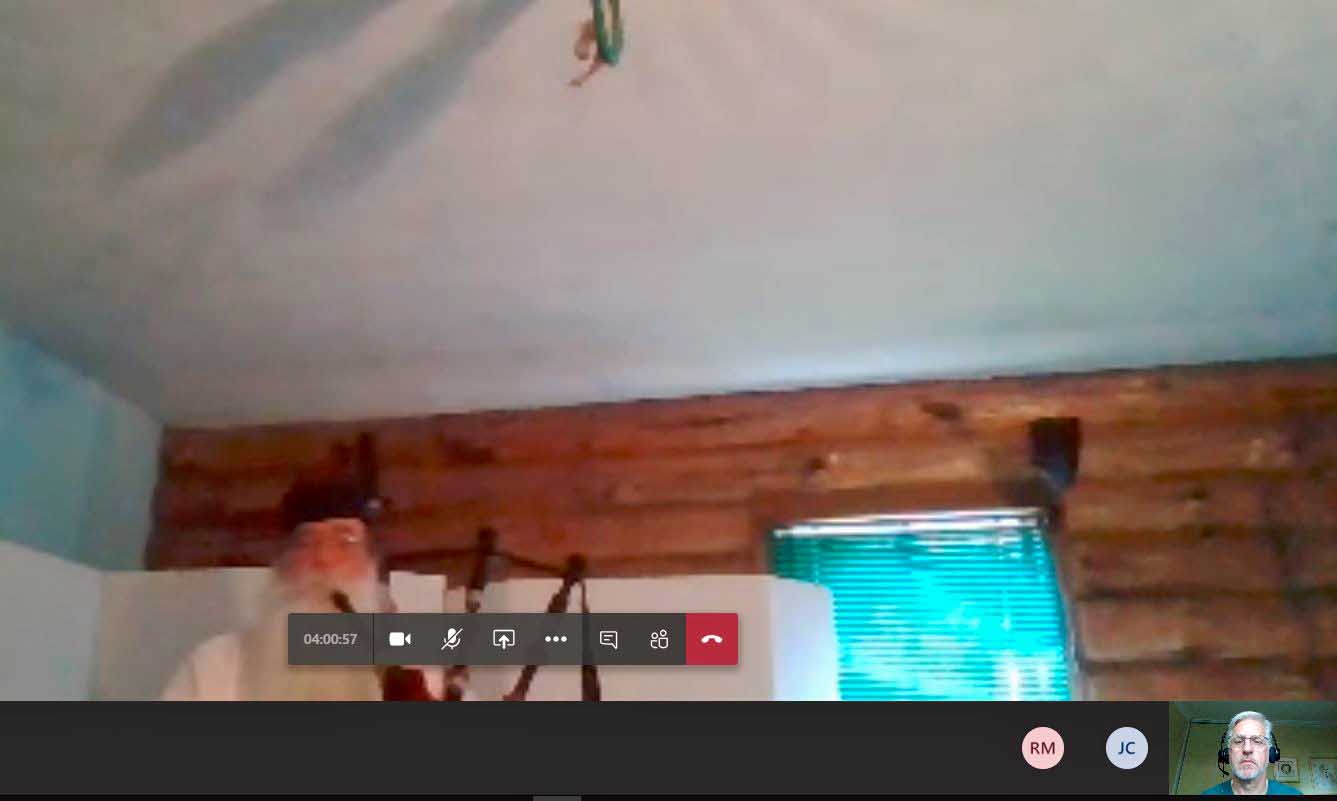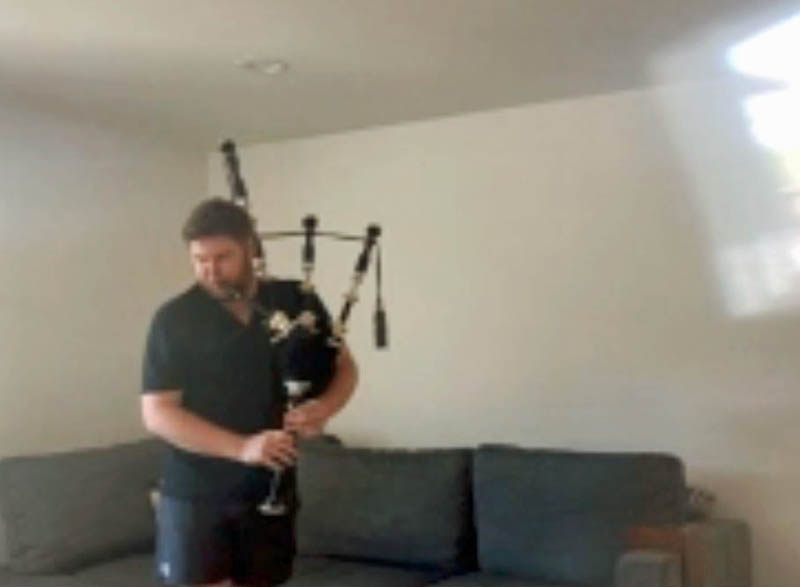Online competitions: a competitor’s perspective
By Brad Davidson
Whether they end up as a passing fancy designed simply to fill a hole caused by the pandemic, or they are a new dawn for piping and drumming competitions, online piping and drumming competitions can offer a multitude of benefits to the parties involved. Most obviously they provide an outlet for musical talent, along with some of the pressures and experience of competition. Participants have deadlines to meet and events to work towards, serving to focus the mind and keep them engaged. Organizers offer a valued service and, with the right ingredients, can enhance their image and benefit the bank account of a worthy cause.
Having participated in a few this year, I’ve seen a variety of formats (live, video recorded / audio recorded) and have some thoughts on how organizers can ensure they are effective and successful.
In general, the criteria and objectives for online competitions should be similar to those ascribed to live events, namely, value to the community, integrity of format and results, and return on effort to the organizers.

Formats and the like
The most important consideration for the event is the format.
The most common by far is to have the competitors upload a video performance to YouTube and send the link to the contest organizer who then shares it with the appropriate judge or judges. It seems this may be one of the more reliable options. It’s a pretty straightforward process once the competitor gets the hang of uploading to YouTube (a single piobaireachd performance can require as much as two hours to upload). The competitor retains control over the video via their YouTube account and can build an archive of recordings, and the organizer can make the links available to a broad audience.
Transmit a recorded video via a service like Dropbox. Seems to work best where there is a small entry as there have been repeated instances of capacity problems relating to storage and mass uploading at the deadline. Once the upload is complete, the organizer is in possession of the recordings, which may or may not be made visible to viewers.
Transmit an audio recording via something like WeTransfer. Similar to Dropbox but without the capacity issues. As I understand it, the thinking here is that by having only the audio recording to work with, the judges face fewer variables or visible distractions as would be the case with a video recording of someone performing in their basement, garage, bedroom, etc.
Host live performances with adjudication via a platform like ZOOM or Microsoft Teams. This has been the least common in my experience, and perhaps for good reason. While this format most resembles the live event (be ready to go when you are called and give it your one and only best shot), it does risk issues with timing and technology on the day.
Anyone contemplating this format please be advised that stewarding can make or break the event. The competitors waiting are generally blind to what is taking place online. They have been given a designated time and know there is likely to be some variability with it, but have no idea if the event is running on time, two minutes behind or 15 minutes behind unless they are kept informed. For pipers, where your bagpipe needs to be blown into tune and can be overblown out of tune, this can make or break their performance. A plan should be put in place to anticipate problems. For instance, in the event a competitor is having difficulty connecting to the platform, there should be a plan to avoid a long delay that makes one competitor’s technology problem successive competitors’ readiness problems.
“It never fails to surprise when the piper in the final tuning room at an event is informed that the judges have just now decided to take their lunch break and that the things will resume in an hour . . . good luck with your pipes.”
Also, as with live contests, the steward will want to determine in advance when the judge will take breaks and build that into the schedule. It never fails to surprise when the piper in the final tuning room at an event is informed that the judges have just now decided to take their lunch break and that the things will resume in an hour . . . good luck with your pipes.
Most online events have elected to have the competitors submit tunes of their own choice. While certainly helpful for those working on new tunes, it doesn’t challenge the competitors who rely on the same tune for multiple events. An added step could be incorporated where someone, whether it be the judges or the organizers, selects from a list of submissions for each competitor and notifies the competitor at some point as to their tune. This can be done for every format.
Integrity
This deserves more than a passing thought. There is something at stake, for the competitors certainly, but also for the events themselves. A prize that is improperly awarded and an event associated with the same calls into question the purpose of the enterprise – presumably, to recognize and reward the best competitors in each event.
“Any justification for not announcing judges in advance is about as persuasive as the argument for announcing the judges, so go with the latter.”
Some contests have gone to some lengths to announce in advance who will be on the judging panel, fewer still who will be judging specific events. Some contests make no mention as to who judged, leaving it all very mysterious. Ideally, this should make no difference, but it does. The bottom line, any justification for not announcing judges in advance is about as persuasive as the argument for announcing the judges, so go with the latter. One begins to think fondly of days past when the local laird, with little or no experience with the instrument, would be invited to judge a piping event.
Perhaps more importantly, all recordings, audio or video, should include the competitor introducing themselves and the name of the competition for which the recording is being made, proceeding to their warmup and performance without editing or interruption. Sadly, without this and given the opportunity, someone, somewhere, will test the format and submit the same recording to multiple events or pull a recording from a long-past practice session as if it were made for the event. As much as possible, these should be avoided. Rather than disqualify outright, an option is to inform someone who fails this “follow the instructions test” they will receive the judge’s comments but will not be considered for a prize, better luck next time.
As much as possible, make all recordings visible to interested viewers. This helps to raise the visibility of the event and broaden the exposure of the music, and it allows all to gain inspiration and enjoyment from listening to the winners.
Dress and deportment – some events required Highland dress while others leave it to the competitor’s taste and discretion (no surprise shorts and t-shirts featured in many a performance). It’s your contest, so you decide the standard.

Judge’s remarks – regrettably, not all online events shared the judge’s remarks with the competitors. We’ll hope this was simply an oversight and something that will be addressed in future. Perhaps the greatest value to all competitors is to receive feedback on their performances.
Return on effort (ROE)
Given the low and manageable overhead expenses of running a virtual or online competition, there is real opportunity for the organizers to realize an acceptable ROE. Whether it be as a fund-raiser, a continuation of a long-standing traditional event or as a purely commercial undertaking, an investment of time and energy is required and should be compensated. Without it, any incentive to offer, innovate and improve these events will largely be absent. By and large, competitors recognize this and appreciate that someone cares enough to undertake the task of hosting these events.
“Whether it be as a fund-raiser, a continuation of a long-standing traditional event or as a purely commercial undertaking, an investment of time and energy is required and should be compensated.”
Streamlining communication should help to minimize the effort involved. What I mean by this is, try to post all criteria, instructions, timelines and deadlines in one place, and transmit important information in as few separate e-mails as possible. Multiple e-mails sent out over the course of three or four weeks pretty much assures that some people will miss something important, creating extra work for the organizers to correct problems. Perhaps one final reminder that includes all relevant instructions and links a week prior to the deadline will serve to keep everyone on the same page.
And, finally, please broadcast the entries and the results. Knowing who’s participating in, never mind taking prizes in online events, is nearly an impossible task otherwise, so please go the extra step and submit the names of the prize winners to piping and drumming publications so they can be recognized and celebrated, enhancing the profile of your event at the same time.
![Brad Davidson in better times at the Gordon Castle Highland Games, May 2019. [Photo Jack Taylor]](https://www.pipesdrums.com/storage/2020/10/Davidson_Brad_2019.jpg)
Brad Davidson was active as a piper and involved with the Pipers & Pipe Band Society of Ontario in the 1980s and early-1990s. He served for five years as president of the organization’s Western Branch and, among many awards, won the Piobaireachd Society Gold Medal (Canada) in 1992. He then took a 24-year break from piping. In the last few years, he returned to competition with success, winning the Winter Storm, Silver Medal Piobaireachd and prizes in a number of online competitions. He lives in Waterloo, Ontario.

NO COMMENTS YET